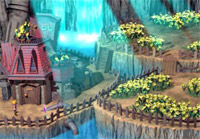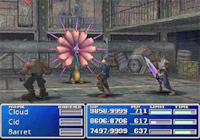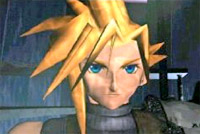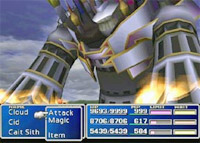




 | 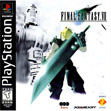 |
| |||||
|
|
It's been called everything from the greatest game of all time to the undeniable peak of an already legendary series. It's a big part of the reason Sony overtook Nintendo and ultimately won the 32-bit chapter of the console wars. And, truth be told, it's single handedly responsible for reviving a passion for video games that had lain dormant within me personally for years. I only really need to say the word "Sephiroth" to send gamers who have played it (or, truthfully, even heard of it) on lengthy trips down memory lane. Very few games have had the kind of cultural impact enjoyed by Final Fantasy VII. In terms of sheer hype and universal acclaim, I'd put it right alongside Super Mario Brothers 3, The Legend of Zelda and Metal Gear Solid as one of the all-time greats. People who have never seen a PlayStation controller in their lives recognize this title. That's how incredible a buzz it generates even today, seven years after its North American release. So, cutting to the chase, is it worth the hype, does it really measure up to those previously mentioned, simplistic, cherished classics of the 8-bit era, can it really be as good as it's been portrayed? Well, yes and no. When any game enjoys the kind of rabid fanbase FF7 has procured, portions of it are bound to be blown out of proportion. To make things crystal clear, Final Fantasy VII is not the best game I've ever played, period. What it is... well, it's easily in the top five. Perhaps the greatest attribute of FF7 is its storyline. It takes an absolutely ingenious set of character designs, wraps each of them in a unique, cartoony-yet-believable personality and drops them into a globe-spanning story that manages to find a perfect balance between fiction and non. The slow parts are very few and far between, and when the story really starts to move you'll blink your eye and realize you've been playing for almost four hours without a break. The characters and the events that swirl so effortlessly around them pull you in so quickly, they almost become a part of your family. I remember reading a thread in a gaming forum somewhere about this game; one member said he sat down to play it again after several years, heard the opening strains of the introductory musical score and wept. The strange thing is, I have no trouble believing it. Until you've played this game, a story like that sounds hokey, phoney and way, WAY over the top. Once you've donated several weekends of your life to these characters, all of a sudden that tale doesn't sound so far fetched after all. At worst, you'll feel your pace quicken when you boot up that first disc for the first time in a few years. The story basically throws players into the fast lane right off the bat. The opening video montage leads directly into a late-night raid on the planet's largest governing body, the Shinra, a raid in which the player is actively a part. As the events unfold, the point becomes clear; you're a mercenary, aiding a terrorist organization in their efforts to destroy a significant portion of the city to make a statement that the Shinra cannot ignore. Five minutes into the game and already it's covered more mature material than the previous six combined. Make no mistake, Final Fantasy VII is not a game you'll want to hand your six year old to help him pass some time in front of the TV. Not only does it cover some rough psychological terrain (mortality, semitism, terrorism and political espionage are discussed, in depth, and confronted) but the characters and dialog themselves aren't nearly as squeaky clean as they were in previous installments. While in-game characters would quarrel and part ways from time to time in earlier episodes, (most notably in FFIV and FFVI, both on the Super NES) the dialog always came off as forced and unrealistic. The warrior leaving your party felt as though he'd just recited a couple pages of Shakespeare, rather than spoken in a truly lifelike conversation. The characters of this initial 3-D Final Fantasy, admittedly, suffer from the same problem from time to time, but their three dimensionality and noticeable personality quirks lead to some colorful conversation and straightforward disdain more often than not. This was the first game I can ever recall Squaresoft producing that featured characters who actually spoke like regular people. If the bad guys are firing their weapons in your direction, your companions won't hold back with the obscenities. No great story can truly accomplish anything without a set of relatable, memorable characters. And, while I won't go so far as to claim Cloud, Barrett, Aerith and Tifa are my favorite set of names and faces in the history of Final Fantasy, they do rank quite high. To tell you the truth, I'd probably place them second only to the outstanding cast that followed in FFVIII. The characters each have a variety of traits, goals and motivations, all of which are explained just when the story seems to best call for it. The characters are deep, interesting, believable and very original. Barrett, for instance, has a major beef with the government that, as it unfolds, probably has more to do with his failures as a husband and a member of his community than anything else. Rather than coming to terms with his own shortcomings as an individual, he launches a revolution and takes his frustrations out on the government that brought all of his flaws out into the spotlight. And he's just a minor character... when the love triangle between Cloud, Aerith and Tifa, as well as the mysteries and conflicting stories behind Cloud's past come to a head, things get even more interesting. Of course, the single unifying plot device that ties all these stories together is equally as intriguing. In the end, all of the story's major issues; religion, mortality, manipulation, astronomy and greed are tied together magnificently as your troop of warriors fights to save the planet from itself. If the proposition of trading blows with a near-omnipotent man-made warrior, in an effort to halt an enormous asteroid on a collision course with your home planet seems a little far-fetched to you, it won't once you've reached the conclusion of this game. The cinema scenes which are relied upon to complete this task on several occasions perform their function marvelously. It's easy to forget, but at the time of its release, nobody had tried anything like what was attempted with Final Fantasy VII's cutscenes. Interrupting gameplay to play a fully three dimensional, pre-rendered movie? This was a long ways from the subtitled slideshows of Ninja Gaiden. Although it wasn't without a notable stumble or two, FF7 emerged all the better for the risk. The way the scenes were handled, as though they were enormous moments in epic films, really took that extra step for the entire industry, setting it directly on the path to compete with (and eventually overtake) motion pictures and television as the dominant form of entertainment in modern life. Just off the top of my head, I can imagine half a dozen cutscenes from this game that knocked the wind out of my sails and showed me something utterly unimaginable at the time. If it weren't for this bizarre reluctance to stick with any one kind of body type (characters appearing in the cinemas vary wildly from jagged, super-deformed, cartoony action figures to extremely realistic, yet stylized, visual treats) I'd call them absolutely flawless. There's no denying the impact of these cutscenes, both in the game itself and in the industry, and if only as a precursor to what was to follow, their inclusion was crucial to the game's legendary status. With that said, the in-game visuals of FF7 are very much lacking, especially in comparison to later titles. This was obviously a very early release for the rugged PSone. Edges were extremely jaggedy, especially so when not in a battle, live renderings of the characters left a lot to be desired and even the cutscenes themselves were compressed poorly, leaving huge artifacts all over the glorious video renderings. In sharp contrast, though, the animation and design of the hundreds of different enemies, players, items and boss characters is amazing, and the variety of static, immovable backgrounds are superbly concepted, executed and presented. This isn't a three dimensional game in the most complete meaning of the word; sure, you're controlling polygons and have almost complete freedom to take them wherever you please, but when you enter any specific town, dungeon or halfway important area, the camera angle becomes static. You're moving a pixelated little cluster of blocks around on a photograph of a city. This is, obviously, nothing new to the Final Fantasy series, as almost every game in the timeline at this point could have been categorized as employing the same method, but it carries with it a unique set of benefits and downfalls. On one hand, the backgrounds deliver an insanely wide range of superb graphic environments that couldn't have been TOUCHED by polygon textures at the time. On the other, it enables developers to hide items and passages behind scenery, when they would've been very obviously placed in a true three dimensional world. Dozens of times, I've been lost in a corner of the screen without any idea of where I should be heading, thanks to a strange trail layout or a difficult-to-identify doorway. While the character designs were extremely well done in this chapter, their translation from ink to screen left a lot to be desired thanks to the aforementioned early limitations of the system. The characters you see in battle look completely different than the characters you see speaking to villagers, walking around the world map or roaming around a dungeon. I suppose what I'm getting at is this; FF7 had its moments, graphically. In this department it has not aged as well as its predecessors, nor its children. Yet it still retains a glimmer of visual appeal... it's not so far gone that it's rendered unplayable or even classifiable as completely ugly. I'm hesitating to say so, but the same praises and critiques could be applied FF7's audio score. In terms of its composition and application to the millions of scenes and environments from the game's start to its finish, this game's soundtrack is amazing. I'd venture to say it's one of the greatest musical scores in video game history. The simple yet memorable themes that fill your ears are, without exception, a perfect match for the scenery, actions and emotions each different scene is meant to display. They're catchy without becoming annoying. They're open-ended enough to loop endlessly, if necessary, yet they never border on monotony. They work masterfully, both as an upfront, tension-inducing crescendo and as a harmless, meandering background tune. No, my problem with this title's audio isn't with its composition or implementation... it's with the execution. To a much lesser degree than the visuals, the musical score is undermined by the medium in which it's been presented. This is a soundtrack that would have shaken the earth if it were performed by a master orchestra. Unfortunately, the difference between a symphonic performance of these classic songs and the spotty, digitized portrayal that shipped with FF7 is as large as the difference between the sketches of the characters themselves and their eventual presentation on-screen. Sure, you'll recognize them without a second glance... but they've been crammed into a format that really can't do them any justice. It's tough to fault a game for colliding with the limits of the platform's technology, especially when it was so close to exceeding those limitations, but I'd be lying if I said it wasn't affecting my enjoyment of the game as a whole. The gameplay remains familiar, yet fresh and interesting when compared to previous releases of the famed RPG series. Your actions in the field and in combat are very similar to those available previously; you instruct your characters to fight, cast magic, use an item, defend, run from battle or any number of other options, depending upon your equipment, and if you've strategized your assault correctly and befriend lady luck, you'll emerge victorious. As has been the case with each new chapter in the Final Fantasy legacy, one new tweak has been thrown into the mix, in this case going under the name of "materia." As the game progresses, you'll find these colorful blocks of concentrated energy (be it on the body of a defeated enemy, alone in a cave somewhere or for sale in a shop) that grant the holder magical abilities. They're the only way to upgrade your characters' actions, and are completely interchangeable between the members of your party. By equipping a block of materia and then defeating enemies, the magic "levels up" and gains new abilities while simultaneously strengthening its previous benefits. Each weapon and bit of armor you find throughout the game has a slot for the employment of materia, which effectively limits the number of them you can use at any one time. You'll eventually need to make some tough choices over which materia to develop and which to ignore. As the weapons and armor you find become more and more powerful, they typically also include more and more slots for materia. Some weapons even have special properties assigned to these slots, allowing your materia to grow at a much faster or slower rate... and it all factors in to the strategy of the system itself. If you own the "steal" materia and want one of your active characters to steal, you just equip them with the materia and go. After you've defeated enough enemies, the "steal" command will evolve into "mug" and your rate of success will improve. It all makes sense, really, the longer you use a particular skill, the better you are at it. A lot of players have voiced a strong dislike for the materia system, claiming it kills the variety of your characters. The common consensus says that by giving the player the ability to assign any skill or spell to any character, Square has basically given you a bunch of clones with which to do battle. I'd have to disagree. If you really want to nitpick and pay attention to the specifics of each character's stats like that, you'll notice that each character has a different affinity to the various materia commands in the world. Sure, you can give anybody in your party the ability to cast "fire," but it's going to cause more damage if you give it to someone with an inherently high magic ability. Square's kept the variety in this cast, they've simply given you the ability to ignore each character's strengths and sculpt an army on your own accord. It's not the most realistic system in the world (what, you suddenly FORGET how to throw something?) but you've basically lost your ties to realism from the moment you plug FF7 in, regardless. I mean, you're running around, chanting, and suddenly incinerating monsters with your magic. It doesn't get more fantasy-laden than that. Through the use of materia, your characters can also gain the ability to summon one of the dozen and a half different "summon monsters" into battle to aid your in fight, one of the most memorable aspects of the title. For the period in which it was released, the amount of work and detail put into these ultra-powerful weapons were just unreal. In the past, summons had been basically a static shot of the monster in question, a quick animated spell and an end result. In FF7, the summons take on a life of their own. Ifrit sails through the air in a ball of fire, howls and hurls himself at your enemies. Titan tears an enormous chunk of earth up, lifts it into the air and smashes it down again. The end results are familiar, but the means of getting there have been given a total overhaul. It's worth noting that up to and even including this title, summons were nothing more than an added attraction. In later games, the monsters became a big part of the storyline, a heavy point of emphasis in gameplay and even completely controllable additions to your team. This is the game that made that transition. The summons and monsters were so unimaginably cool and exciting that Square was all but FORCED to make them a more important part of the game in their wake. In this title, they toe the line between under-utilization and over-saturation. One interesting addition to this game was that of the various mini games strewn about important parts of the story. Though its bread and butter is still the same, familiar old turn-based role playing, occasionally you'll stumble across a challenge that thrusts you into more of an action or arcade-based game type. You'll avoid obstacles and attempt stunts in a poorly developed snowboarding level. You'll swing your sword at the enemy in a motorcycle chase scene. On one hand, they're a nice distraction from what can occasionally become a monotonous journey through parts unknown. On the other, they usually feel like a cheap, rushed, unimportant extra that wasn't ready to go out onto the shelves just yet. I appreciate the idea, as it was eventually put to use a bit more appropriately in later chapters, but I often found myself wishing they'd left the mini games out. What it all comes down to is this; the theory behind Final Fantasy VII is outstanding, yet simple: create a game with an untouchable story, tremendous characters, amazing design, mouth watering special effects and great musical accompaniment. It was the right game with the right pop culture appeal at the right moment. It accomplished every single one of its goals, and it's going to win "best video game ever" polls from now until the end of time because of it. What it won't win, though, is a perfect ten from yours truly. While I'd be more than happy to go so far as to say the story contained herein is the best of all the Final Fantasy games, I can't say the same for most of the other aspects of the game. The visuals and audibles are hampered by the PSone's own internal limitations, the characters are topped by Squall, Rinoa and company in FF8, and the mini games make me shake my head more than they entertain me. This is very, VERY close to perfection, but I've admittedly played a few titles that are better. Overall Score: 9.8 |


